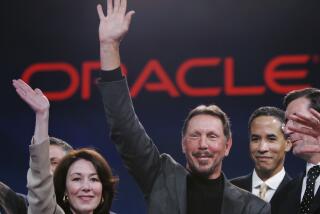Eisner’s Paycheck Humbled in 2001
- Share via
Walt Disney Co. Chief Executive Michael Eisner, once one of America’s most highly paid executives, took a hefty pay cut last year, reflecting the entertainment giant’s bleak financial results.
Eisner’s total pay dropped to $1million last year from $12.3million in 2000, largely because he received no bonus and did not exercise any stock options, according to documents Disney filed Friday with the Securities and Exchange Commission. It was the second time in three years that Eisner did not receive a bonus.
Disney President Bob Iger, who received a $5-million bonus in 2000, also did not get a bonus last year. Both Eisner and Iger received salaries of $1 million in 2001.
Disney said the two top executives did not qualify for bonuses because the company failed to meet its net income and other financial targets in 2001.
Disney cut 4,000 jobs and posted a net loss of $158 million for fiscal 2001, reflecting write-offs from the closing of the company’s Go.com Internet portal, as well as falling attendance at the company’s theme parks and a slowdown in advertising at its ABC television network.
Disney was already suffering from the economic slowdown before the terrorist attacks of Sept. 11 intensified the company’s problems.Three other top Disney officers, however, did receive bonuses last year totaling $2.3 million.
Chief Strategic Officer Peter Murphy and Chief Financial Officer Tom Staggs each received $1-million bonuses, while Disney’s executive general counsel Louis Meisinger got a $300,000 bonus. Meisinger was the only executive to exercise stock options, gaining an additional $884,055.
Disney said in its filing that the “special bonuses” were paid to the three top executives because of “extraordinary services,” including their work on Disney’s $5.2-billion acquisition of the Fox Family Worldwide cable channel.
Eisner’s compensation at Disney reached its peak in December 1997 when he earned $576 million, the bulk of it by exercising $569.8 million in stock options. But his pay has come under increasing scrutiny from shareholders in recent years as Disney’s stock performance has lagged behind its peers.
Disney’s stock, which rose 58 cents Friday to close at $22.70 on the New York Stock Exchange, is trading close to where it was five years ago.
“[Eisner] did the right thing,” said compensation specialist Graef Crystal, who designed Eisner’s early pay formulas but no longer consults for Disney. Graef had been highly critical in 2000 when Eisner saw his cash compensation increase from $750,000 to $12.3 million in a year when Disney’s net income fell 29%.
Crystal noted that Eisner did not seek to re-price his Disney options last year or obtain new grants, a tactic other corporate chiefs have used to obtain pay hikes even in down times. Indeed, as Disney’s stock fell 28% last year, Eisner saw a $266-million paper loss in the value of his 21 million stock option grants, according to Disney’s filing.
Not that Eisner, 59, is hurting.
Forbes magazine says Eisner remains one of the wealthiest media executives in America with a net worth of $720 million. And Eisner, who has run Disney since 1984, owns more than 13 million shares of Disney stock.
In the filing, Disney’s board also recommended that shareholders reject a proposal that would prevent the company from using its independent auditor, PricewaterhouseCoopers, for consulting services, saying the company has safeguards to protect the auditor’s independence.
Disney disclosed that it paid $25.2 million to Pricewaterhouse during its last fiscal year for consulting services, including areas such as strategic sourcing, electronic procurement and the development of an Internet portal for employees.
In an unrelated development, Disney shareholders filed a lawsuit Thursday over $140 million in severance payments to the company’s former president Michael Ovitz. The talent agent left Disney in 1996 after 14 months on the job.
The lawsuit, filed in Delaware Chancery Court in Wilmington, Del., contends that Disney directors were “grossly negligent” by giving only a cursory review of Ovitz’s employment agreement before it was approved by the board in 1995. A judge dismissed an earlier suit challenging Ovitz’s package.
“We have every confidence we will prevail again,” Disney spokeswoman Michelle Bergman said.
A spokesman for Ovitz declined to comment.
*
Times staff writer James Bates contributed to this report.
More to Read
The biggest entertainment stories
Get our big stories about Hollywood, film, television, music, arts, culture and more right in your inbox as soon as they publish.
You may occasionally receive promotional content from the Los Angeles Times.











